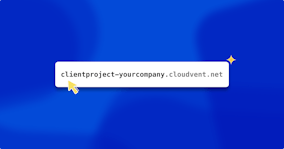Make your websites faster with CloudCannon

The speed of your website impacts many aspects of your business. Google found that going from a load time of one second to five increased the bounce rate by 90%.
Not only will you lose customers on a slow website but it will rank lower in search engines, conversions will suffer, as will customer happiness.
We strive to make CloudCannon Hosting one of the fastest out there. Today we're looking at how we achieve fast load times and how it benefits your business and customers.
Cloudflare Partnership Direct link to this section
One of our main focusses of CloudCannon Hosting is delivering files as quickly as possible, anywhere in the world. Previously our infrastructure served sites out of California. This was fast if you were viewing a site while in California, but slow viewing it from anywhere else.
To solve this issue, we set out to partner with a CDN provider to serve CloudCannon websites from edge nodes around the world. After testing all of the major CDN providers out there, we settled on Cloudflare.
Last month we rolled Cloudflare out across the majority of sites hosted on CloudCannon and the speeds speak for themselves. On our old infrastructure the full download of an HTML file could be upwards of 500ms. With Cloudflare we're seeing this consistently drop to under 20ms around the globe.
It's worth noting you don't need your own Cloudflare account to take advantage of this. Either use CloudCannon DNS or CNAME your subdomain to sites.cloudcannon.com and your site will serve through Cloudflare's super fast network.
Asset Finger Printing Direct link to this section
The cache control header defines how long an asset should be cached before attempting to request it from the server again. Ideally you want to cache assets for as long as possible as it greatly reduces requests while browsing a website. The downside of caching for too long is if you do change the asset, it might take a while before everyone has the new version.
CloudCannon performs automatic asset finger printing which gets around serving stale assets. It works by renaming the asset to include a fingerprint of the contents. For example a file called style.css might become style-74b87337454200d4d33f80c4663dc5e5.css after finger printing. If the contents changes so will the file name which forces the browser to request the new file. This allows CloudCannon to cache these files for years without it going stale.
Asset Optimisations Direct link to this section
Descriptive variable names and plenty of white space are great ways to make your CSS and JavaScript easier to understand for humans. When it comes to computers, having the source code nicely formatted and readable code has no impact on how it's processed yet adds to the file size which impacts load time.
Minifiers help solve this problem by turning a nice human readable file into a condensed file that basically only a computer can understand. CloudCannon automatically minifies JavaScript files using Uglifier and CSS using clean-css. This gives you the best of both worlds where your source code remains nicely readable and the build site has minified assets.
Compression Direct link to this section
In the past, internet speeds were slower so it was common to zip a document before emailing it to someone to reduce the file size. Compression on a web server works in a similar way. When the browser requests a file it adds a header defining which compression algorithms (if any) it understands. Before the server sends the response it compresses the body which greatly reduces the file size. Once the browser has the response it can uncompress the body to get the original response.
CloudCannon automatically runs gzip or brotli compression for supported content types which greatly reduces the file size meaning faster load times for your customers.
Path Rewriting Direct link to this section
Every time you make a request to a URL, the browser sends the cookies it has for that domain. If you're using the cookies for authentication, analytics or some other use this is a necessary overhead. However, there are many situations where you don't need the cookies. It's rare that you would need to process cookies when requesting an asset like an image or CSS file so the overhead of sending them is wasted.
By default CloudCannon rewrites asset paths to serve them from a custom CDN domain. The browser won't have any cookies for the CDN domain so the overhead is avoided altogether.
Summary Direct link to this section
We're constantly striving to make CloudCannon Hosting the fastest on the internet and to do it automatically. Keep an eye out for future performance improvements we have in the pipeline.
Launch your website today
Give your content team full autonomy on your developer-approved tech stack with CloudCannon.




